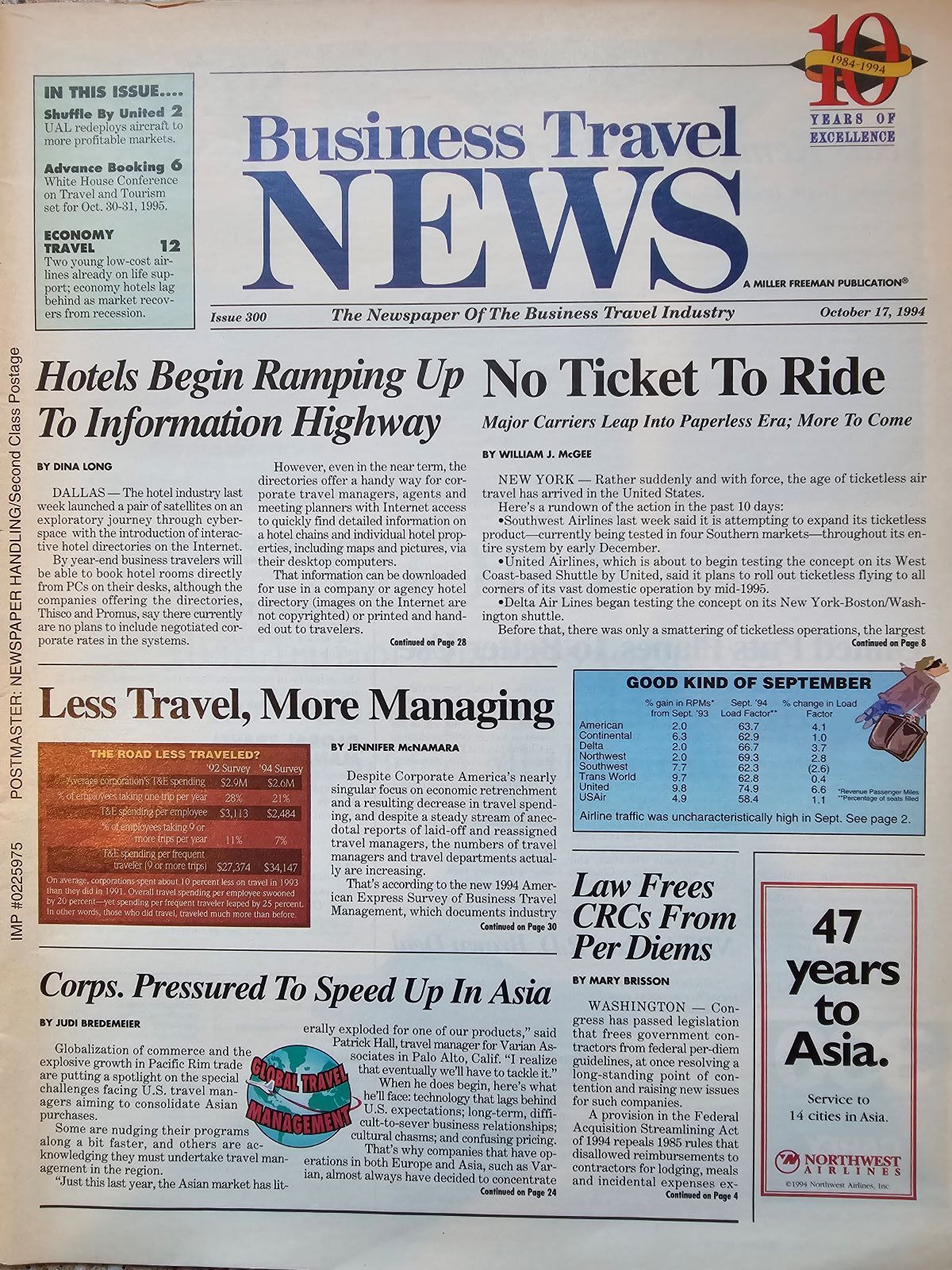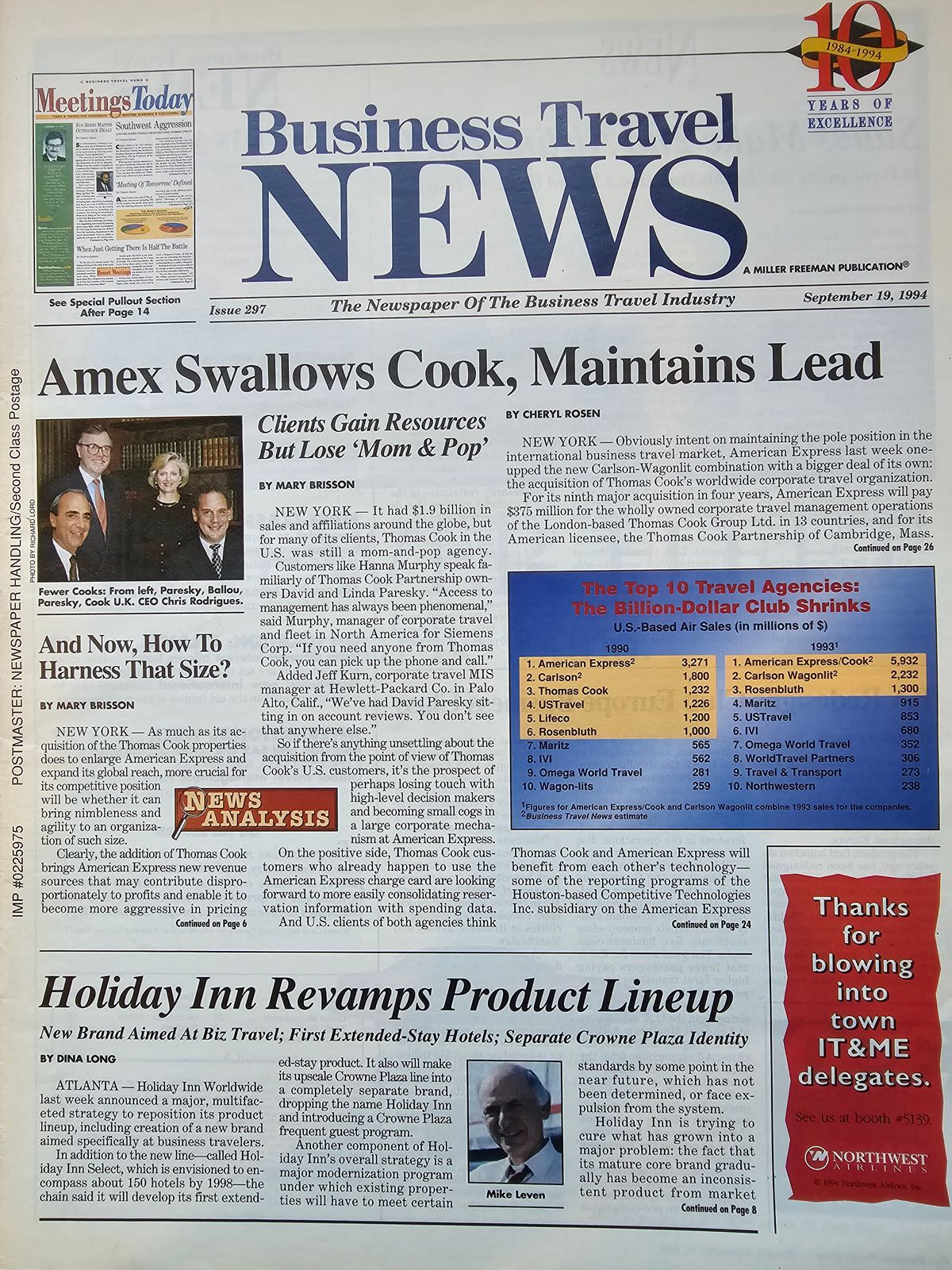The year 1994 was a year of beginnings for me, BTN and the
business travel industry. I was named BTN Editor-in-Chief in November of 1993.
This was just weeks before Business Travel News and other travel publications
of founding publisher CMP Publications were bought by Miller Freeman. As Miller
Freeman recently had acquired Gralla Publications, which included competitor
Corporate Travel magazine, we quickly integrated the best of Corporate Travel
into Business Travel News and began BTN’s second decade with Corporate Travel’s
lead editor Mary Ann McNulty as part of our incredible team. Now, 30 years, and
many career twists and turns later, Mary Ann and I remain BTN colleagues.
I spent 1993 year covering BTN’s meetings beat. As the new chief
editor in ‘94, I went on a quick listening tour to get a deeper understanding
of the needs of corporate travel buyers and TMCs. I learned a lot from
listening:
- The industry suffered from a lack of qualified
business travel agents - Buyers wanted benchmarks and success stories so
they could improve their programs - Automation was driving travel program
efficiencies - Consolidation and globalization were shaping
travel programs internally as well as through supplier offerings.
Even the most astute BTN editors and reporters had no idea
how the year ahead would reflect and build on those arcs.
Mega Beginnings
Soon after the year got underway, we learned Carlson Travel
Network had worked out a deal to merge with French-based Wagonlit Travel, one
of Europe’s largest travel management companies. Dramatizing the global scope
of the deal, Carlson and Wagonlit leaders held a press conference at the United
Nations building in New York to announce the tie-up.
That global consolidation didn’t stand alone that year. In an
apparent one-upping of the Carlson Wagonlit Travel mega merger, American
Express announced in the fall the $375 million acquisition of Thomas Cook’s
worldwide corporate travel organization, which included what was then one of
the largest TMCs in the United States.
We are still finding out how mega the megas can be, but 1994
was when agency consolidation really went global.
Beginning of the End of Airline Commissions
As big a deal as those big deals were, it was another move
that year that signaled a much bigger deal was afoot regarding the future shape
of business travel: Delta Air Lines sliced the first cut out of agency airline
commissions.
It didn’t happen until November, and the reduction from 10
percent to 8 percent only applied to international airfares, but everyone knew this
small slice was the first shot across the bow, to be followed by a coming
barrage. The possibility of commissions had been the hot topic that July at the
National Business Travel Association convention as airlines had been hinting, if
not overtly warning, agencies that distribution costs were too high, and
commissions and override reductions were in the line of fire as a remedy.
While many TMC executives were up in arms about what that
would mean to the economics of their business—and of those clients who relied
on commission rebates to fund their travel programs—some saw the idea of
negotiating fares net of commissions, overrides, credit card fees and taxes as
a more stable and sustainable business model.
Seeing the writing on the wall, individual buyers also had
begun to negotiate net fare deals with airlines. An organized attempt by 40
corporate travel buyer members of the Business Travel Contractors Corporation proposed
that summer to negotiate a new mileage-based net fare contract with airlines. The
controversial overture didn’t succeed but it garnered attention and,
ultimately, did a lot to advance the concept of net fare contracting.
To read about the next step in the commission reduction saga,
you’ll have to wait until the beginning of 1995. And while the eventual
elimination of commissions didn’t come until 2002, 1994 marked the beginning of
the end.

An Even Bigger Beginning: The Internet
Another milestone of that year was much less heralded at the
time but precipitated another huge leap forward along the arc of automation,
the introduction of the internet as a vehicle for business travel transactions.
To put it in perspective Yahoo launched in 1994, Internet Explorer launched in
1995.
In October 1994, hotel industry tech companies Thisco
and Promus announced plans to offer interactive hotel directories on “the
Internet.” The innovation would enable direct bookings but wouldn’t yet include
corporate negotiated rates. While BTN had written about “the information super
highway” a number of times, this might have been the first mention of the
internet in BTN.
Thisco and Promus preceded an explosion in the application
of the internet to booking and other travel management functions by a matter of
months, so you’ll be reading all about it next week when we recap 1995.
_______________________________________________________________________

_______________________________________________________________________
[Editor’s Note: BTN is missing the archive issues for January, February and June 1994, but don’t worry; the balance makes clear how dynamic the year was for the business travel industry.]

IBM attempts to leverage loyalty points in negotiations with
American and United Airlines. By withholding loyalty points from its business
travelers, the computing giant hopes to gain an additional 8 percent off “Y”
coach fares. Within two weeks, BTN reports the airlines have rejected the
strategy.
American Express launches Windows-based travel management
and credit card reporting programs that include “automatic graphing and faxing
features” to distribute visuals to stakeholders.
Federal Aviation Administration OKs Global Positioning
Systems for civil transportation, enabling more direct routes for airlines.
Once used only for military operations, GPS one day will could be applied to
“automotive vehicles,” according to the BTN article.
Carlson Travel Network, the second largest travel agency in
the U.S., announces a planned merger with Europe agency leader Wagonlit Travel.
White-knight private investor buys 100% of USTravel; the
agency commits to 10-year agreement with Electronic Data Systems Corp to revamp
its business; CEO Peter Sontag is ousted by July.

Avis pilots a security strategy that uses in-vehicle
“cellular phones” linked to a “travel service center” that offers directions,
roadside services, police assistance, traffic reports and… wait for it…
“yellow-page listings!”
Hotel entertainment system provider Spectradyne launches
in-room movie technology that allows guests to receive faxes and voice messages
via the hotel television.
Hyatt Hotels debuts “ATM-Like Check-In” activated by a
credit card swipe.
Rosenbluth introduces a corporate card as well as a
procurement card in effort to compete with American Express
Delta Air Lines forms Business Travel Advisory Council, with
15 travel manager advisors forming each of 10 councils in major U.S. markets.

Southwest Airlines clashes with Apollo CRS, System One and Worldspan
over whether the airline will pay for ticketing services since it does not
participate in distribution through those systems. The CRSs
cut Southwest out of ticketing and consolidated reporting services. Southwest
responds by producing its own interim “CRS” and ticketing capability for
agencies called Southwest Air Ticketing (SWAT). It didn’t solve reporting
issues, but it addressed the urgent ticketing need. Seven months later,
however, Southwest would be the first airline to introduce electronic tickets.
Airline-owned SatoTravel, which was designed to serve
government travel, enters corporate market.
Hyatt launches yield management system that allows it to
prioritize high-return business, “assuming the program works as intended,”
wrote BTN.
Georgia-Pacific Corp. boycotts Delta Air Lines claiming
discounts from the airline were unsatisfactory given their volume; the matter
is settled after publicity gets uncomfortable. Neither side divulges details
about the final deal.

Kevin Mitchell builds buy-in for the Business Travel
Contractors Corporation, an organization formed to propose a new mileage-based
net fare structure scheme for airlines and a group of 40 business travel
clients.
16 Latin American airlines form LatinPass a joint frequent
flyer program aimed directly at U.S. business travelers
Association of Corporate Travel Executives launches U.K.
chapter, its first chapter in Europe.
National Business Travel Association convention talk swirled
around air carriers’ hints that agency commissions and override schemes were in
the line of fire; reduction of these revenue streams would exacerbate, for
agencies, the already lower earnings precipitated by a 10% decline in average
airfares.

Thomas Cook unveils voice recognition phone reservations
called “Thomas Cook Voice Express” and made clear it had plans to sell the tech
to other agencies.
United Airlines sets schedule for its new low-fare shuttle
product, planning to operate most of its flights from San Francisco; but it has
set up pilot contracts to operate as much as 25% of its schedule can be part of
the Shuttle operation, fueling speculation about robust expansion plans that
would differentiate it from competitors like Delta Shuttle and USAir Shuttle
that serve a very targeted set of routes in the Northeast.
Citicorp Diners Club offers VAT reclaim service
Avis reveals plans to offer point-to-point directions from a
computerized kiosk at rental desks by entering the address for origin and
destination. Or, “You can ask directions to the three closest restaurants or
the nearest ATM,” according to an Avis exec at the time.
Amex client benchmarking group makes plans in conjunction
with the agency, to negotiate hotel rates collectively.

American Express announces the acquisition of Thomas Cook’s
worldwide corporate travel organization for $375M, one-upping the mega-merger
between Carlson Travel Network and Wagonlit, just months prior.
Continental and America West announce extensive code-sharing
and joint marketing agreement; the deal greatly increases Continental’s
presence on the West Coast, while America West got added clout on the East
Coast.
U.S. Department of Transportation, citing inadequate safety measures from targeted
countries, bars airlines from Belize, Dominican Republic, Gambia, Ghana,
Honduras, Nicaragua, Paraguay, Uruguay and Zaire from flying into U.S.
Holiday Inn introduces Holiday Inn Select, aimed at business
travelers, and separates Crowne Plaza as a separate brand with its own loyalty
program.
Delta fuels shuttle fire with expansion plan to link
Atlanta-New York with hourly service and considers other key business routes
like Atlanta-Chicago.
Radish Communications Systems unveils VoiceView, which
allows agencies to send booking screens to customers’ PCs during the booking
process; it interrupts the voice call for approximately three seconds while the
screen is transmitted.
BTN runs a front-page article on the rise of personal
digital assistants, which it calls “wireless handheld computers” with
“internal, wireless modems” that make it possible to communicate from “taxicabs
and meeting rooms.”

Impending sale of National Car Rental to Vestar Equity
Partners raises concerns among the travel buyer community.
Electronic Data Systems Corp., which earlier in the year was
part of a 10-year agreement to revive USTravel, forms a new business line to
design tech products for travel management.
Multiple airlines begin testing e-tickets, with Southwest
leading the charge. The Dallas-based airline has test programs underway; United
Shuttle is poised to begin testing and Delta will also test on its shuttle
product.
Hotel industry tech companies Thisco and Promus announce
plans to offer interactive hotel directories on “the Internet” that will enable
direct bookings, though will not include corporate negotiated rates. This may
be the first use of the nomenclature “Internet” in BTN.
Alaska Airlines announces plan to reduce participation in
Sabre; the move further erodes the once-critical operational bond between CRSs,
airlines and agencies, coming after Southwest’s refusal to bend in April to the
CRS “participation” demands of Apollo, System One and Worldspan and, instead,
forming SWAT. SWA eventually is the first to launch a direct-booking enabled
website.

Delta reduces agency commissions on international airfares
to 8 percent, down from the industry standard 10 percent. The move follows a
number of other commission nuances that apply to certain ticket
types—initially, reduced commissions on shuttle fares and now international
fares. The move, which will eventually be emulated and escalated by other
carriers and for domestic fares, not only impacts agencies, but also threatens
revenue-share contracts with corporates.
USTravel and IVI appear close to forging a merger deal.
American and United launch a loyalty points scheme for
corporate clients that allow them to purchase miles for 2 cents each and then
gift those miles as certificates to employees, as corporate incentive rewards.
Hyatt Hotels launches franchise operation to expand its
footprint.

Sabre considers increasing prices for travel agencies and
corporate accounts, as supplier-customers (read: airlines) clamor for lower
distribution fees.
Lufthansa, United and Thai airlines sign a multilateral pact
for code-sharing and joint marketing.
Amex announces corporate card reporting that breaks out
property-specific spending; it will include citywide spending summaries in 50
major business travel markets globally.
Change in ARC card-billing frequency (to daily from weekly)
promises to snarl processes for agencies and corporations whose purchasing and
reconciliation procedures were calibrated to take advantage of billing delays.
_______________________________________________________________________

David Meyer is the executive director of conference content and strategy for the
BTN Group. He was the editor-in-chief of BTN from 1993 to 2010, when he began to take on other content roles, specifically in industry research and eventually heading up content strategy for BTN’s roster of 40-plus annual events.
_______________________________________________________________________

